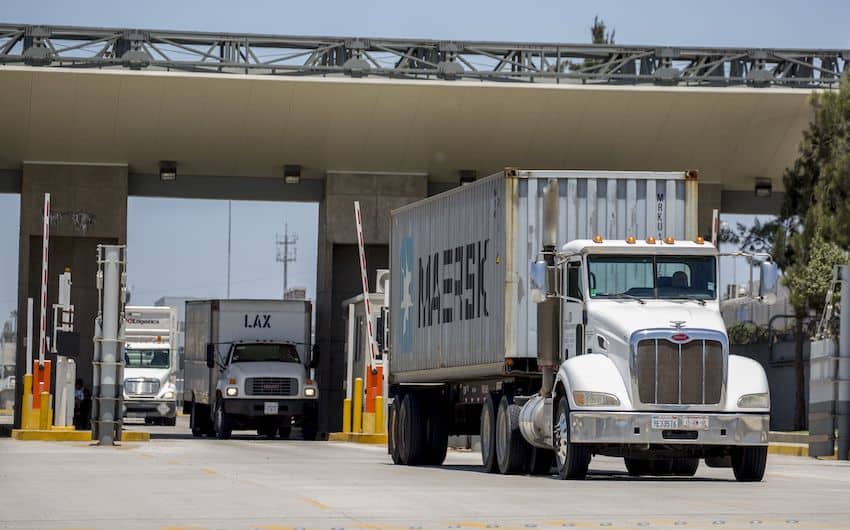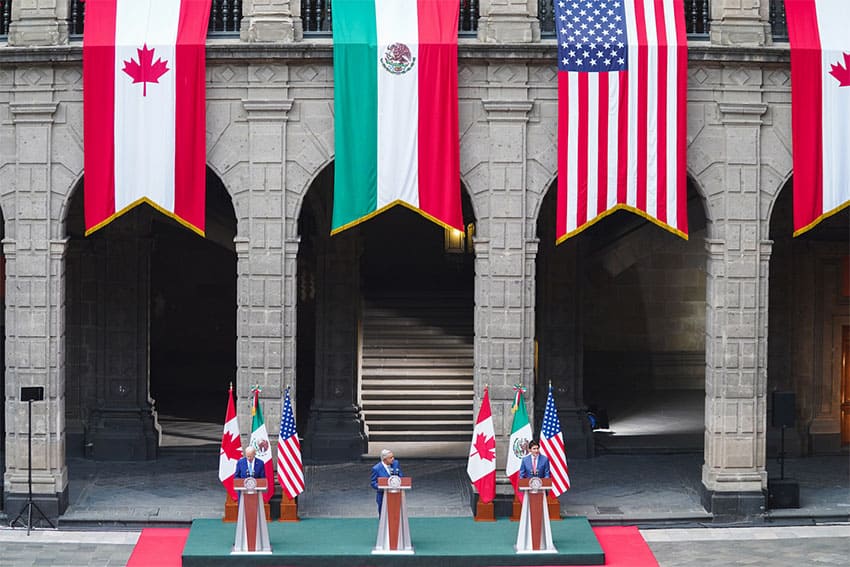Mexico maintains position as largest trade partner of the US

Mexico was the United States’ largest trade partner in the first six months of 2023, with the value of the exchange of goods between the two countries reaching a record high of almost US $400 billion, according to official U.S. data published Tuesday.
Mexico beat out Canada and China to claim the enviable title of largest trade partner of the world’s largest economy.
Mexico-U.S. trade totaled $396.6 billion between January and June, the United States Census Bureau reported. That figure – up 3.1% compared to the same period of last year – accounts for 15.7% of the United States’ total international trade in the first half of 2023, which was worth some $2.55 trillion.
The United States’ exchange of goods with Canada accounted for 15.4% of total U.S. trade, while China ranked as the third most important trade partner of the U.S. with commerce between those two countries representing a 10.9% share of the $2.55 trillion pie.
Mexico’s exports to its northern neighbor were worth $236.04 billion in the January-June period, a 5.4% increase compared to the first half of last year. Mexico had a 15.5% share of the U.S. import market, ahead of Canada’s 13.8% and China’s 13.3%.
United States’ imports to Mexico were worth $160.55 billion in the first half of the year – practically unchanged from the same period of last year – leaving Mexico with a two-way trade surplus of $75.49 billion.

Mexico exports a wide range of goods to the United States including vehicles, auto parts, crude oil, electronics, fruit and vegetables, meat and beverages such as beer and tequila. U.S. imports to Mexico include gasoline, agricultural products including corn used as livestock feed, capital goods such as machinery and plastics.
Gabriel Casillas, head of Latin America economics at Barclays, said that the appreciation of the Mexican peso – which can make Mexican products more expensive when sold abroad – didn’t seem to have had an effect on Mexican exports in the first half of the year. Demand for Mexican goods outweighed the increased cost of same due to the appreciation of the Mexican currency, he said.
“While we don’t see a slowdown of the U.S. economy it will be difficult to see a downturn in Mexican exports,” Casillas said.
Mario Correa, an independent economist, said that “North America is the natural destination for Mexican exports” and noted that the United States-Mexico-Canada Agreement, the free trade pact that superseded NAFTA in 2020, “gives us a great advantage compared to other regions and countries.”

The USMCA seeks to strengthen the integration of the Mexican, U.S. and Canadian economies and thus make the three countries less dependent on supply chains outside the region. The data on the Mexico-U.S. trade relationship in the first half of 2023 provides a concrete example of a benefit the free trade agreement has brought to Mexico, even as it succeeds Canada as the United States’ largest trade partner. The USMCA – largely negotiated while former presidents Enrique Peña Nieto and Donald Trump were in office – has also helped spur the nearshoring phenomenon in Mexico, in which foreign companies relocate here to take advantage of proximity to the United States.
Luis Adrián Muñiz, deputy director of economic analysis at Monterrey-based brokerage Vector, said that Mexico’s ranking as the United States’ largest trade partner this year “makes perfect sense” considering the significant investment made by companies that have relocated here from other parts of the world.
Numerous foreign companies have recently set up operations in Mexico, or taken the decision to do so, to take advantage of quick and easy access to their main market – the United States. A range of other factors, including affordable labor costs, the presence of a large educated workforce and growing challenges associated with operating in China have also encouraged firms to relocate to Mexico.
The growing nearshoring phenomenon was cited as a major reason why foreign direct investment reached an impressive $18.6 billion in the first quarter of the year, according to preliminary data that is invariably revised upward.

To further develop Mexico’s exporting potential, the country needs a robust and diversified energy sector that includes the generation of electricity from renewables, Correa said.
Marcelo Ebrard, the former foreign affairs minister who resigned in June to focus on winning the ruling Morena party’s nomination for the 2024 presidential election, said late last year that Mexico needs to increase the use of renewables “at a rate even faster than the United States” to ensure it can comply with any clean energy requirements the U.S. imposes on exports to that country.
Ebrard subsequently said that Mexico would collaborate with the United States to double its capacity to produce renewable energy by 2030.
President López Obrador on Tuesday emphasized the importance of the trade relationship between Mexico and the United States. He noted that Mexico has recently supplanted Canada as the United States’ largest trade partner and said he was hopeful that the nation he leads would hold onto that position.
“The environment for investment is very good in Mexico, there are unbeatable conditions,” he said, adding that Mexico is the world’s “preferred” country for foreign investment.
With reports from El Financiero and El Economista
Source: Mexico News Daily

